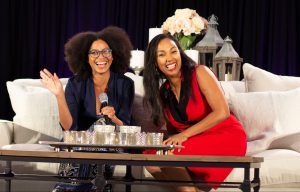Spotlight on Dietitian Speaker Lisa Young
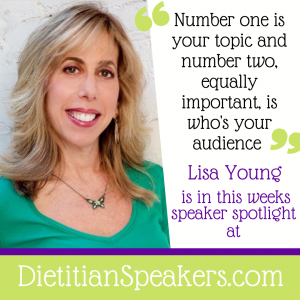
AC: Can you tell us a little bit about your current speaking focus and how it fits into the other work that you do?
LY: I first got started speaking as a PhD student. I had done research on growing portion sizes and had received a grant, a little Dean’s grant from NYU, which meant you had to present your research. It was different from the teaching I was already doing, even though that was a class with over 100 students, and I remember practicing that talk so many times.
Now I have a combo job – speaking, teaching, research and private practice. That’s one of the things I love about being a registered dietitian – there are so many things you can do. I teach a very large intro nutrition class at NYU while continuing my research on portion trends, and then my private practice offers the clinical application.
My speaking is related to two areas – speaking to experts on my research areas and speaking to consumers where I give the research in a more usable and applicable way.
AC: That’s nice that you get to touch on both sides with research and application. I would imagine that in your job you have different expectations about when you’re speaking for free versus expecting to be paid. Can you share how you navigate that?
LY: There are several questions that go into the decision for me. Who is the sponsoring organization? Are they going to pay somebody else if they don’t get me? If someone’s going to get paid, I’m happy for it to be me. But what if nobody’s getting paid? Is it worth it to me to give that talk? Will I get clients out of it? Am I passionate about the topic? Is it my way of giving back?
There are certain talks that I wouldn’t do if even if they are for pay. Sometimes it just isn’t worth it. If it was a time that wasn’t convenient for me, or I know the organization’s audience wouldn’t necessarily be my clientele. If an organization has funds to pay somebody, I will black and white say, you know, what did you have in mind? I would
want to hear what they have to say, and I would not give a talk for free if I know that they’re paying somebody else to give a talk.
And there are certain free talks that I would give, for example to my synagogue, where nobody would get paid, and I might get clients out of that. Sometimes I’m asked to speak about different topics like heart health, nutrition and women’s issues, mindful eating, nutrition and kids. So how passionate I am about the topic and the audience factor in, too. There’s no one size fits all approach, and I think that even the most experienced speaker might occasionally still do a freebie as a way to give back. But it depends on what it is.
I often see questions in dietitian chat groups about this, and it’s not the best place to get advice, because no one else can answer the questions for you. What are you passionate about? What is your soul calling? I don’t think you can ask somebody else what you should do, because it all depends on the specific situation. How passionate are you about the topic? Will this be a stepping stone where somebody else might see your presentation and maybe they’ll contact you to work together? You know, that is worth its weight in gold, so you might not be paid for the talk. And if nobody else is paid that’s also talking, then it’s OK. If other people are paid and you’re not, not OK. 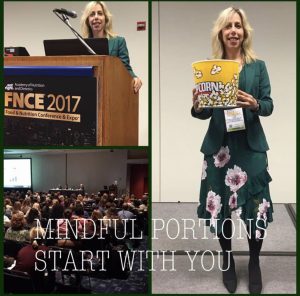
There’s more: Who’s asking you to speak? Do you have a book coming out? I did many more free talks when my book came out. I mean, there was a period when my second book came out and I was already more experienced and I was speaking every day. It was right before the pandemic and some of the talks were paid. Some of them weren’t. But I was doing book signings and I was promoting the book. So that might be worth doing a free talk. Fast forward two years later. Let’s pretend there was no pandemic. If you’re not marketing a book and you’re not looking for new clients, that same talk might not be worth it for you. And how much preparation time is it going to be for you? Can you just walk in and do it, or you’re going to have to do a ton of prep?
It’s all individual passion. So it’s not really something you can ask somebody else.
AC: Those are really great questions for someone to consider. Thank you. What about when you’re in the audience? What do you look for in a speaker?
LY: You want somebody who not only is an expert on the topic, but they know how to deliver the material in a user-friendly way where they capture their audience, and their audience continues to listen and stay with them. As an audience member, I don’t want to listen to a boring talk and I don’t want to listen to something that I can just read somewhere else. I really don’t want to listen to someone reading. I want some personal stories, whether it’s client experiences, positive or negative, and other things that are beyond just the didactic or the educational. When I walk away, I want to know what to do with this information or research topic. Don’t just talk to me, take it to the next level.
That’s the way I think about it when I’m planning a talk. I think it’s important for newbie speakers to know that number one is your topic and number two, equally important, is who’s your audience and how are you going to make your talk available user-friendly so they can relate to it? A lot of consumers couldn’t care less about the research. They just want to know what they should do. You might have brief research pointers at the end, but your main focus is how I can apply this.
For experts, for example at the Academy of Nutrition & Dietetics Food & Nutrition Conference & Expo recently, I was talking about mindful eating and portion sizes, focusing on the research and the evidence because the audience was dietitians. For consumers, I may mention the research briefly, but the main focus is going to be the application. What can you as a consumer do with this information and how can you, as an individual, put it into practice? I try to make sure that I’m reaching my audience so you could talk about the same topic to different audiences, but you have to do it differently in order to be effective.
Another thing is to have interesting slides. Don’t spend more than a minute a slide. You’re better off with more slides, less words and have pictures that the audience can relate to. One slide can be turned into 10 and you’re better off. People are not going to listen to you if you have 20 concepts on a slide. You’re talking but they’re not listening to you, they’re reading the slides. You only want to talk about what is on the slide that you’re showing. That’s it. Let them read the words while you’re talking and then they listen to you. If you’re talking about one thing and then there’s another concept on the slide, they’re not listening to you, they’re reading the slide. They’re going to miss what you say. So, you’re better off taking those 20 concepts or 10 concepts and having them on 10 different slides and having more slides but going through them more quickly
instead of having so many concepts on one slide. Then you have your image on a slide and you can tell a story about it. You know, in my case, I had a lot of visuals of portions of portion sizes. Have something that the audience can relate to instead of scientific facts and pouring excessive information that you feel like you have to get through.
AC: Great points, thank you. When you think back over your experiences speaking, is there any specific event that sticks out in your mind?
LY: Yes! My first big talk after I finished my PhD. I was the keynote speaker, which as you know is a tall order for your first talk. It was at 8 am, and I am not a morning person. And it was in Maine, during a snowstorm. I didn’t know if I would even get there. It was freezing cold, the flight was delayed, all sorts of issues. Luckily, eventually I got there.
So they say you should always be up two hours before you’re speaking, because if not, you won’t be at the height of your alertness. I don’t know if that’s true or where I heard it, but as I said, I’m not naturally a morning person. I can’t just roll out of bed at 7:15 to get to an 8 am talk. I try to exercise before I talk because it really just gets me going. So I remember getting up so early and not being a morning person in the first place, that was rough. And I did over-prepare and go over my notes many times. I probably still have that talk in my head. I probably could give that whole talk by heart without my slides in front of me because of how many times I rehearsed it!
Finally I walked into the room, which was tremendous because it was a keynote, but also because they were eating at these big round tables that took up this entire tremendous room. I was thinking, oh my God, I’m going to have to speak in front of these people in a room this big. It made it look much more intimidating because the tables were so spread out. But it turned out to be a really great experience, and it became much easier later in the future.
AC: Thank you for sharing that. It’s so important to remember that everyone starts somewhere and then continues to improve and learn. Any other advice for newer dietitian speakers?
LY: Absolutely. I think that very often we underestimate what we could do. If you are asked to do something that you don’t know you can do, why not just say yes and rise to
the occasion? Often we’re afraid to take that plunge and go into another area, whether it’s speaking about a slightly different topic or weaving something else in. Say yes and branch out into another topic.
Also, you can’t hear this too many times: your audience doesn’t need you to give them a full educational lesson and say every single thing about your topic. You want to give them enough information, but it doesn’t have to be an encyclopedia’s worth. I am very detail-oriented, and I want to give them all the facts, all the background, and make sure that they have tons of information. They don’t need all of that. They don’t want a PhD in it. One or two important points and then apply lessons that they can use.
AC: Exactly. Thank you so much, Lisa. It was a pleasure talking to you.
To hire Lisa for your next event, visit her website at drlisayoung.com.
Follow Lisa on social media: Facebook @Dr.LisaYoungNutrition, Instagram @drlisayoung, and Twitter @drlisayoung.

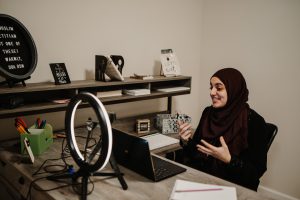



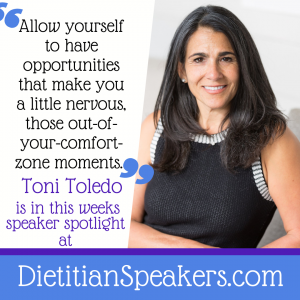
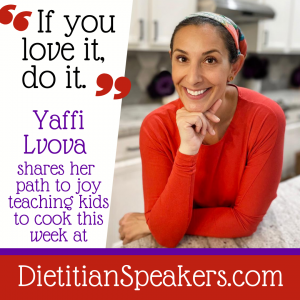

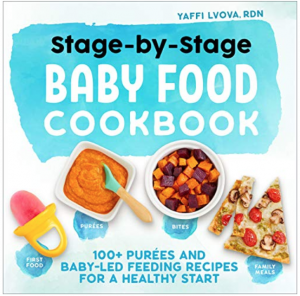

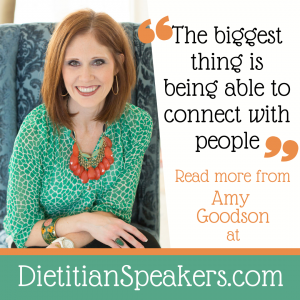
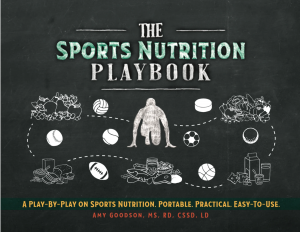
 Superstar alert! Dietitian Speaker Nancy Clark is the
Superstar alert! Dietitian Speaker Nancy Clark is the 

 DS: You’re a very accomplished speaker in addition to your extensive media work. Tell us your origin story.
DS: You’re a very accomplished speaker in addition to your extensive media work. Tell us your origin story.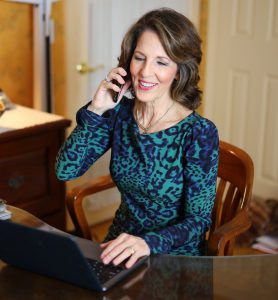 engagements that were scheduled pre-pandemic morphed from in-person appearances into
engagements that were scheduled pre-pandemic morphed from in-person appearances into 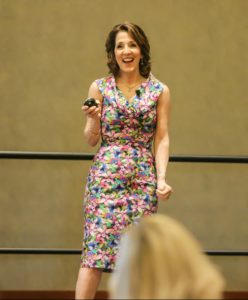 As dietitians, we deserve to get paid for our worth, and there are many RDs that need to embrace their importance, but it’s not only money that has value.
As dietitians, we deserve to get paid for our worth, and there are many RDs that need to embrace their importance, but it’s not only money that has value.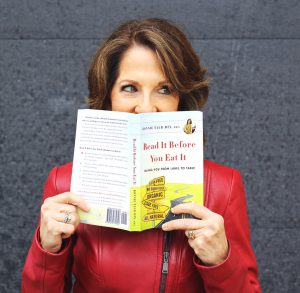 And although I still get the jitters when I speak in front of certain groups or when I talk about certain subjects…I wish I had felt more confidence back in the day. Confidence comes across in your voice and it helps to boost credibility and expertise. I’ve found that when I coach RDs about how to work with media, it’s confidence that they lack more than anything. After being in this profession for decades, sharing my personal and professional evolution with RDs is perhaps the most rewarding role I play.
And although I still get the jitters when I speak in front of certain groups or when I talk about certain subjects…I wish I had felt more confidence back in the day. Confidence comes across in your voice and it helps to boost credibility and expertise. I’ve found that when I coach RDs about how to work with media, it’s confidence that they lack more than anything. After being in this profession for decades, sharing my personal and professional evolution with RDs is perhaps the most rewarding role I play.
 I’ve also made speaking without being paid into part of my marketing plan to introduce my services to other dietitians, especially on my podcast
I’ve also made speaking without being paid into part of my marketing plan to introduce my services to other dietitians, especially on my podcast 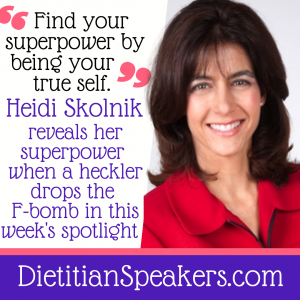
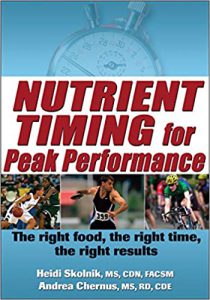
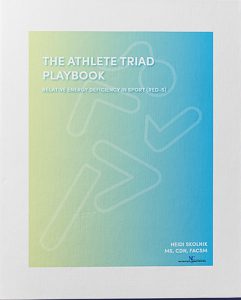


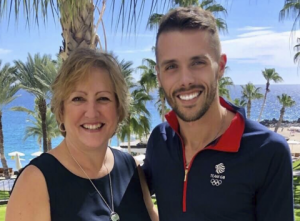
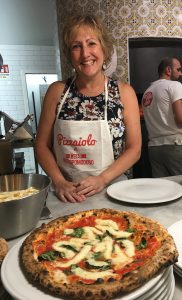
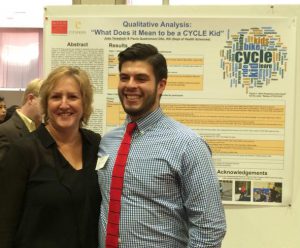

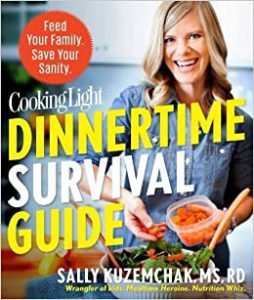
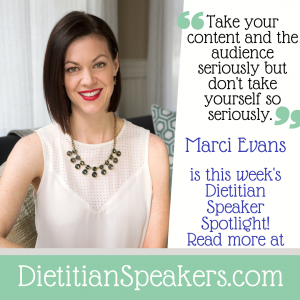
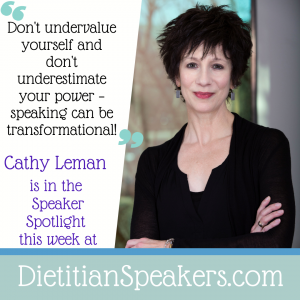
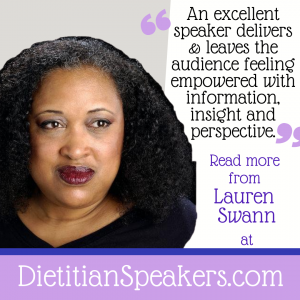
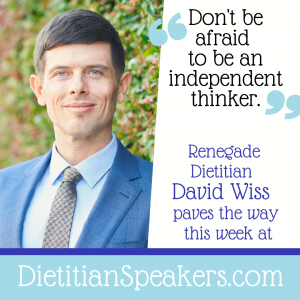
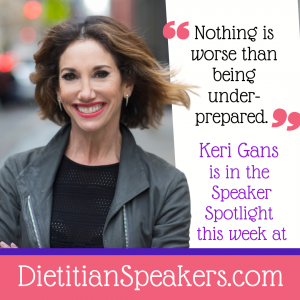
 Talking with Deanna Seagrave-Daly about her speaking career is like drinking from a fire hose – her ideas and strategies bubble up and out in a fountain of enthusiasm. Read on as she shares her best tips with DietitianSpeakingGuide.
Talking with Deanna Seagrave-Daly about her speaking career is like drinking from a fire hose – her ideas and strategies bubble up and out in a fountain of enthusiasm. Read on as she shares her best tips with DietitianSpeakingGuide.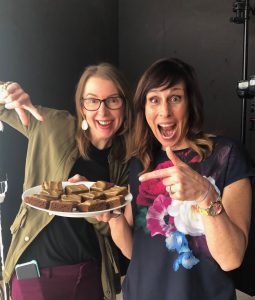
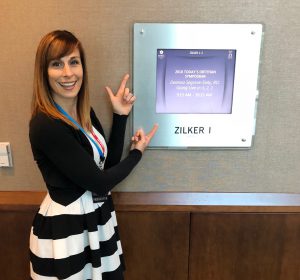 DSG: That’s such a cool way to maximize your opportunities – speak on something you’re passionate about and help a product you believe in get more publicity.
DSG: That’s such a cool way to maximize your opportunities – speak on something you’re passionate about and help a product you believe in get more publicity.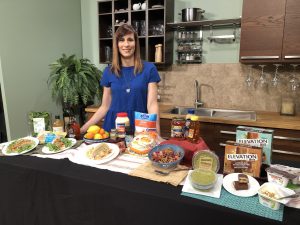
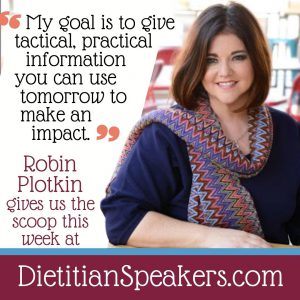
 Alex Caspero is a Dietitian Speaker who knows how to pivot. From growing her speaking niche to adapting to covid life, read on for her take on professional speaking and why it’s good to feel uncomfortable.
Alex Caspero is a Dietitian Speaker who knows how to pivot. From growing her speaking niche to adapting to covid life, read on for her take on professional speaking and why it’s good to feel uncomfortable. Leslie Bonci has a signature style that’s easy to spot: she hits home-runs with her puns and rhymes at the right times. Read on as she shares her favorite speaking topics and tips with DietitianSpeakingGuide.com.
Leslie Bonci has a signature style that’s easy to spot: she hits home-runs with her puns and rhymes at the right times. Read on as she shares her favorite speaking topics and tips with DietitianSpeakingGuide.com.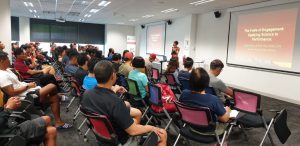
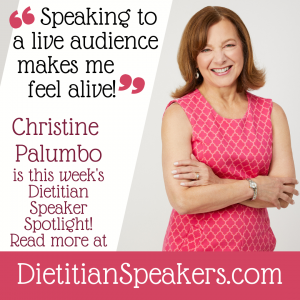
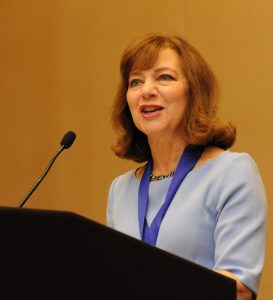
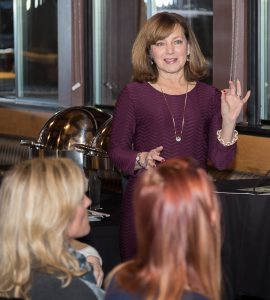 DSG: Wow. As Jessica says, evaluations often reflect more about the writer than the presentation, and the negative ones really stick in your mind. Let’s end on a positive note – what’s your favorite compliment?
DSG: Wow. As Jessica says, evaluations often reflect more about the writer than the presentation, and the negative ones really stick in your mind. Let’s end on a positive note – what’s your favorite compliment?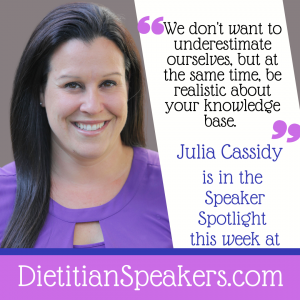 Julia Cassidy’s lovably authentic vibe shines through in everything she does, especially presenting. Read on as she gets real with DietitianSpeakers.com about armpit sweat, comfort pants, and why people like when things get messy.
Julia Cassidy’s lovably authentic vibe shines through in everything she does, especially presenting. Read on as she gets real with DietitianSpeakers.com about armpit sweat, comfort pants, and why people like when things get messy.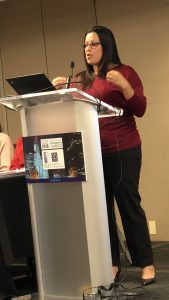
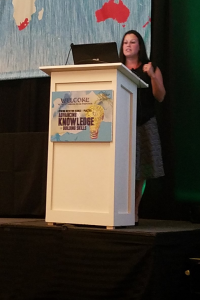

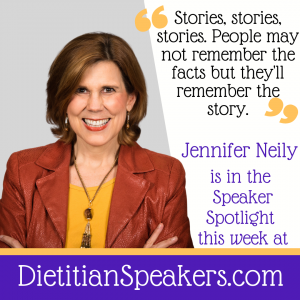 Like
Like 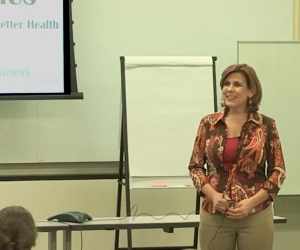
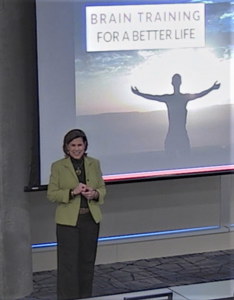 DS: First of all, kudos to the writer for originality. That is certainly memorable. It takes confidence to put that behind you. Have you always been so confident as a speaker?
DS: First of all, kudos to the writer for originality. That is certainly memorable. It takes confidence to put that behind you. Have you always been so confident as a speaker? If the name Jessica Jones rings a bell, it may be because she’s a superhero. Not the Marvel superhero Jessica Jones – this Jessica Jones is a superhero
If the name Jessica Jones rings a bell, it may be because she’s a superhero. Not the Marvel superhero Jessica Jones – this Jessica Jones is a superhero 